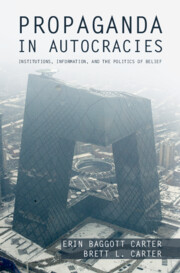Book contents
- Frontmatter
- Dedication
- Epigraph
- Contents
- Figures
- Tables
- Acknowledgments
- Part I Foundations
- 1 Persuasion and Domination
- 2 A Theory of Autocratic Propaganda
- 3 A Global Dataset of Autocratic Propaganda
- Part II The Political Origins of Propaganda Strategies
- 4 The Politics of Pro-regime Propaganda
- 5 Narrating the Domestic
- 6 Narrating the World
- 7 Threatening Citizens with Repression
- Part III The Propaganda Calendar
- 8 The Propagandist’s Dilemma
- 9 Memory and Forgetting
- Part IV Propaganda, Protest, and the Future
- 10 Propaganda and Protest
- 11 Conclusion
- References
- Index
- Other books in the series
6 - Narrating the World
Published online by Cambridge University Press: 18 July 2023
- Frontmatter
- Dedication
- Epigraph
- Contents
- Figures
- Tables
- Acknowledgments
- Part I Foundations
- 1 Persuasion and Domination
- 2 A Theory of Autocratic Propaganda
- 3 A Global Dataset of Autocratic Propaganda
- Part II The Political Origins of Propaganda Strategies
- 4 The Politics of Pro-regime Propaganda
- 5 Narrating the Domestic
- 6 Narrating the World
- 7 Threatening Citizens with Repression
- Part III The Propaganda Calendar
- 8 The Propagandist’s Dilemma
- 9 Memory and Forgetting
- Part IV Propaganda, Protest, and the Future
- 10 Propaganda and Protest
- 11 Conclusion
- References
- Index
- Other books in the series
Summary
Propaganda narratives about international affairs are analytically distinct from those about domestic conditions, since citizens know less about life abroad. This has two implications. First, without a shared sense among citizens for which claims are implausible, what constitutes absurd propaganda is unclear. Second, propaganda apparatuses are able to “get away” with more negative coverage without undermining their neutrality. As a result, propaganda narratives about international news are relatively similar across autocracies. This chapter documents two common propaganda tactics: comparison sets and selective coverage. We pair our cross-country data with case studies from Russia and China. The Russian government confronts more binding electoral constraints than the CCP, but their coverage of Western democracies is similar. The Russian propaganda apparatus often lets Donald Trump speak for it, since he vindicates claims about the collapse of the European Union, the allegiances of Crimeans, the misadventures of America’s foreign policy, and the flaws of American democracy. The CCP’s propaganda apparatus is less fond of Trump, but covers similar issues, often with sophistication.
Keywords
Information
- Type
- Chapter
- Information
- Propaganda in AutocraciesInstitutions, Information, and the Politics of Belief, pp. 228 - 288Publisher: Cambridge University PressPrint publication year: 2023
